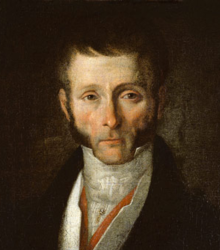Joseph Fouché
| Joseph Fouché | |
|---|---|
 |
|
| President of the Executive Commission | |
|
In office 22 June 1815 – 7 July 1815 |
|
| Monarch | Napoleon II |
| Preceded by | Office created |
| Succeeded by |
Office abolished (Talleyrand as Prime Minister) |
| Minister of Police | |
|
In office 20 July 1799 – 3 June 1810 |
|
| Preceded by | Claude Sébastien Bourguignon-Dumolard |
| Succeeded by | Anne Jean Marie René Savary |
|
In office 20 March 1815 – 22 June 1815 |
|
| Preceded by | Jules Anglès |
| Succeeded by | Jean, comte Pelet de la Lozère |
|
In office 7 July 1815 – 26 September 1815 |
|
| Preceded by | Jean, comte Pelet de la Lozère |
| Succeeded by | Élie, duc Decazes |
| Deputy of the National Convention | |
|
In office 20 September 1792 – 2 November 1795 |
|
| Constituency | Nantes |
| Personal details | |
| Born |
21 May 1759 Le Pellerin, France |
| Died | 26 December 1820 (aged 61) Trieste, Italy |
| Nationality | French |
| Political party |
Jacobin Club (1789–1795) Independent (1795–1820) |
| Other political affiliations |
Girondists (1792–1793) Montagnards (1793–1794) Thermidorians (1794–1799) |
| Religion |
Cult of Reason then Roman Catholicism |
Joseph Fouché, 1st Duc d'Otrante (21 May 1759 – 25 December 1820) was a French and Minister of Police under Napoleon I. He was particularly known for his ferocity with which he suppressed the Lyon insurrection during the Revolution in 1793 and for being minister of police under the Directory, the Consulate, and the Empire. In English texts, his title is often translated as Duke of Otranto.
Fouché was born in Le Pellerin, a small village near Nantes. His mother was Marie Françoise Croizet (1720–1793), and his father was Julien Joseph Fouché (1719–1771). He was educated at the college of the Oratorians at Nantes, and showed aptitude for literary and scientific studies. Wanting to become a teacher, he was sent to an institution kept by brethren of the same order in Paris. There he made rapid progress, and was soon appointed to tutorial duties at the colleges of Niort, Saumur, Vendôme, Juilly and Arras. There he was initiated into Freemasonry at "Sophie Mademlaine" lodge in 1788. At Arras he had had some encounters with Maximilien Robespierre both before the revolution and in the early days of the French Revolution (1789).
In October 1790, he was transferred by the Oratorians to their college at Nantes, in an attempt to control his advocacy of revolutionary principles - however, Fouché became even more of a democrat. His talents and anti-clericalism brought him into favour with the population of Nantes, especially after he became a leading member of the local Jacobin Club. When the college of the Oratorians was dissolved in May 1792, Fouché gave up the church, whose major vows he had not taken.
...
Wikipedia
